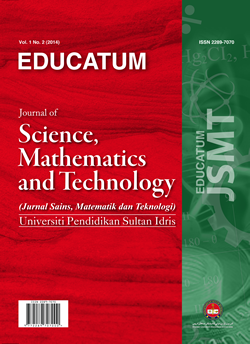Fillquation: A Game-based Learning Material in Numeracy Education
DOI:
https://doi.org/10.37134/ejsmt.vol12.1.11.2025Keywords:
Gamification, Math-Interest Inventory Checklist, Basic Operations, Math Intervention, Basic reproduction numberAbstract
– The study indicates that educational games can significantly enhance learning motivation and effectiveness. This study employed descriptive – qualitative method to evaluate the features and acceptability of a proposed game-based learning material by three expert teachers. It also examined the material's effectiveness on the interest of (n=24) students in grades 4 to 6 at Tabugon Elementary School. The evaluation utilized the Department of Education's standard LRMDS instrument, alongside a modified math interest inventory checklist. Findings revealed increased the student level of interest in solving basic math operations, with students showing positive attitudes towards its use. The study concluded that the game-based learning material effectively boosts students' interest and aids in learning basic math concepts.
Downloads
References
Literacy for life. (2006). Education for All Global Monitoring Report 2006. https://doi.org/10.54676/hfrh4626
Dieckmann, N. (2008). Numeracy: A Review of the Literature. Social Science Research Network. https://doi.org/10.2139/ssrn.1561876
OECD (2019). Programme for international student assessment (PISA) result from PISA 2018. https://www.oecd.org/pisa/publications/PISA2018_CN_PHL.pdf
Mullis, Ina V.S., Martin, Michael O., Foy, Pierre., Kelly, Dana L., & Fishbein, Bethany. (2019). TIMSS 2019 international results in mathematics and science. https://www.iea.nl/sites/default/files/2021-01/TIMSS%202019-International-Results-in-Mathematics-and-Science.pdf
Capate, R. N. A. and Lapinid, M. R. C. (2015). Assessing the Mathematics Performance of Grade 8 Students as Basis for Enhancing Instruction and Aligning with K to 12 Curriculum. De La Salle University, Manila.
Chand, S., Chaudhary, K., Prasad, A., & Chand, V. (2021). Perceived causes of students’ poor performance in mathematics: A case study at Ba and Tavua Secondary Schools. *Frontiers in Applied Mathematics and Statistics, 7*. https://doi.org/10.3389/fams.2021.614408
Tembe, N., Anyagh, P. I., & Abakpa, B. O. (2020). Students mathematics interest as correlate of achievement in mathematics: Evidence from a sub-Saharan student sample. ScienceOpen. https://doi.org/10.14293/s2199-1006.1.sor-.pplypgg.v1
Naungayan, R. (2022). Attitude towards mathematics and mathematics achievement of secondary school learners in Banayoyo-Lidlidda district. *Puissant, 3*, 395-407. Retrieved from https://puissant.stepacademic.net/puissant/article/view/89
Collaborative learning | Center for Teaching Innovation. (2020). Retrieved from https://teaching.cornell.edu/teaching-resources/active-collaborative-learning/collaborative-learning
Ramli, I. S. M., Maat, S. M., & Khalid, F. (2020). Game-based learning and student motivation in mathematics. *International Journal of Academic Research in Progressive Education and Development, 9*(2). https://doi.org/10.6007/ijarped/v9-i2/7487
Jabeen, S. M., Aftab, M. J., Awan, T. H., & Siddique, M. (2021, May 29). Prevalence of students with learning difficulties in basic arithmetic operations in the subject of mathematics at elementary level. ResearchGate. https://www.researchgate.net/publication/353837600_Prevalence_Of_Students_With_Learning_Difficulties_In_Basic_Arithmetic_Operations_In_The_Subject_Of_Mathematics_At_Elementary_Level
Khalid, M., & Embong, Z. (2019). Sources and possible causes of errors and misconceptions in operations of integers. *International Electronic Journal of Mathematics Education, 15*(2). https://doi.org/10.29333/iejme/6265
Ebner, M., & Holzinger, A. (2007). Successful implementation of user-centered game-based learning in higher education: An example from civil engineering. *Computers & Education, 49*(3), 873–890. https://doi.org/10.1016/j.compedu.2005.11.026
White, K., & McCoy, L. P. (2019). Effects of game-based learning on attitude and achievement in elementary mathematics. *Networks: An Online Journal for Teacher Research, 21*(1), 1–17. https://doi.org/10.4148/2470-6353.1259
Collaborators, Q. (2023, August 17). In-depth analysis: What it is + Free Tips. QuestionPro. https://www.questionpro.com/blog/in-depth-analysis/
Harris, P. (2019c, January 7). Benefits of Playing Board Games - Bucks County Free Library. Bucks County Free Library. https://buckslib.org/benefits-of-playing-board-games/
Mental health benefits of playing card games. (2022, December 11). Sprint Medical. https://sprintmedical.in/blog/mental-health-benefits-of-playing-card-games
Game Mechanics – UAF Center for Teaching and Learning. (n.d.). https://ctl.uaf.edu/game-mechanics/
Lee, C. I., Chen, I. P., Hsieh, C. M., & Liao, C. N. (2017). Design Aspects of Scoring Systems in Game. Art And Design Review, 05(01), 26–43. https://doi.org/10.4236/adr.2017.51003
Denville (2017, Oct 19). Why Math Games are Important. https://www.mathnasium.com/blog/why-math-games-are-important
Arden, Melanie. (2021, Nov. 30). How to Use Bloom's Taxonomy to Support Learning Objectives. https://www.prodigygame.com/main-en/blog/blooms-taxonomy/
Forehand, M. (2010). Emerging perspectives on learning, teaching, and technology. Bloom's taxonomy, 41(4), 47-56.
Nisbet, Jordan. (2023, July 25). Game-Based Learning: Pros, Cons & Implementation Tips for Educators. https://www.prodigygame.com/main-en/blog/game-based-learning/
Facomogbon, M., & Bolaji, H. (2017). Effects of collaborative learning styles on performance of students in a ubiquitous collaborative mobile learning environment. *Contemporary Educational Technology, 8*(3), 268-279.
Pho, Annie & Dinscore, Amanda. (2015). Game-Based Learning. Spring. https://acrl.ala.org/IS/wp-content/uploads/2014/05/spring2015.pdf
Orbon, Cyril R. & Sapin, Sherwin B. (2022) Effectiveness of Game-Based Learning Instructional Materials in Enhancing the Mathematics Performance of Grade 8 Learners. Asian Journal of Education and Human Development (AJEHD). file:///C:/Users/ACER/Downloads/AJEHD2022_5.+EFFECTIVENESS+OF+GAME_edited.pdf
Debrenti, E. (2024). Game-Based Learning experiences in primary mathematics education. Frontiers in Education, 9. https://doi.org/10.3389/feduc.2024.1331312
Adipat, S., Laksana, K., Busayanon, K., Asawasowan, A., & Adipat, B. (2021). Engaging students in the learning process with game-based learning: The fundamental concepts. International Journal of Technology in Education (IJTE), 4(3), 542-552. https://doi.org/10.46328/ijte.169
Fried, R. (2019, January 7). Benefits of playing board games. Bucks County Free Library. Retrieved from https://buckslib.org/benefits-of-playing-board-games/
Brame, C.J. & Biel, R. (2015). Setting up and facilitating group work:
Using cooperative learning groups effectively. Vanderbilt University Center for Teaching. Retrieved [todaysdate] from http://cft.vanderbilt.edu/guides-sub-pages/setting-up-and-facilitating-group-work-using-cooperative-learning-groups-effectively/.
Downloads
Published
Issue
Section
License
Copyright (c) 2024 Rey De Lemios, Aubrey Labitag, Sunshine Loresto, Angelica Laguidao, Jesus Parena Santillan

This work is licensed under a Creative Commons Attribution-NonCommercial-ShareAlike 4.0 International License.





